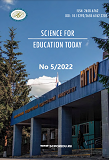Оценка квалификации педагога в контексте задачи его профессионального развития: анализ зарубежной теории и практики
Assessment of teacher competence within the context of their professional development: Analysis of international theory and practice
Author(s): Viktoria Arkadievna Prudnikova, Lev Isaakovich Fishman, Irina Samuilovna FishmanSubject(s): Education, Labor relations, Methodology and research technology, Pedagogy
Published by: Новосибирский государственный педагогический университет
Keywords: Assessment; Professionalism; Professional development; Quality of teaching; Teacher evaluation; Teacher performance; Frameworks for teaching;
Summary/Abstract: Introduction. The paper is concerned with the solution of an important research problem – the construction of a methodology for the development of procedures and tools for evaluating teachers within the framework of an independent assessment of their competencies based on the analysis of Russian and international theory and practice. The purpose of the article is to identify conceptual approaches and evaluation models widespread in the international theory and best practice of evaluating teacher performance which can be used in building a national system of independent evaluation of teacher professionalism. Materials and Methods. Competence and system-activity approaches became the methodological basis of the study. A comparative and problem analyses of the evolution of models for assessing teachers’ professionalism were implemented by means of general research methods of analysis, synthesis, comparison, generalization, systematization, and historical periodization. The sources included international publications from more than 30 countries, covering the period of the last 25 years. The sources were analyzed from the point of view of the expediency and possibility of using these approaches in building up a national system of independent assessment of teacher professionalism as a tool which would ensure both professional development of individual teachers and enhancing professional growth of educators all around the country. Results. The results of the analysis indicate the impossibility of direct transfer of international concepts and experience of teacher evaluation to the national system of independent assessment of teacher professionalism but allow the authors to make suggestions to the developers of the content and format of such inventories. Evaluation of proficiency in the subject taught may be deemed appropriate only at the theoretical part of the professional exam. Analysis of international models of teacher evaluation shows that Russian professional standards should be improved in terms of specifying labor functions and labor actions in such a way that they allow to fix clearly and unambiguously criteria that are understandable to all the stakeholders and can serve as a basis for independent assessment of professionalism as well as for identifying professional difficulties of teachers. It is important that identical assessment tools can be used to achieve the goals mentioned, but the ways of interpreting the assessment results should differ, since the same tools are designed in one case to carry out an administrative (summative) assessment, and in the other to serve the purposes of a formative assessment to compensate for the teacher's professional deficits. The developers should provide for the possibility of specifying criteria by clarifying the context of activities to consider the priorities of educational policy, regional specifics, and the specifics of educational institutions. Developers must also comply with the requirements for assessment tools, ensuring their ability to assess qualifications objectively, validly, and reliably for compliance with agreed criteria. The requirements of informing the objects about the evaluation objectives and procedure in advance, the need for special training of experts to conduct the evaluation procedure and summarize its results, and special measures aimed at ensuring the acceptance of the evaluation procedure by all the stakeholders are also relevant. Conclusions. Conclusions contain recommendations for the developers of the independent assessment procedure of teacher professionalism based on the findings of the analysis conducted.
Journal: Science for Education Today
- Issue Year: 12/2022
- Issue No: 5
- Page Range: 113-136
- Page Count: 24
- Language: Russian

